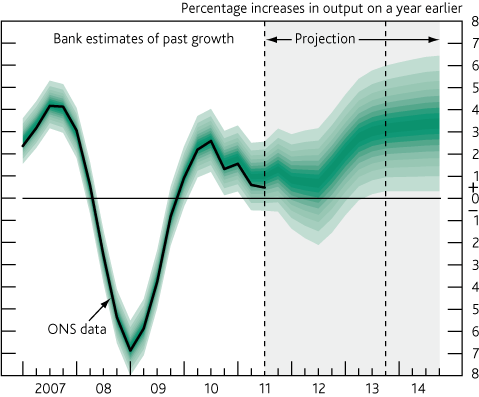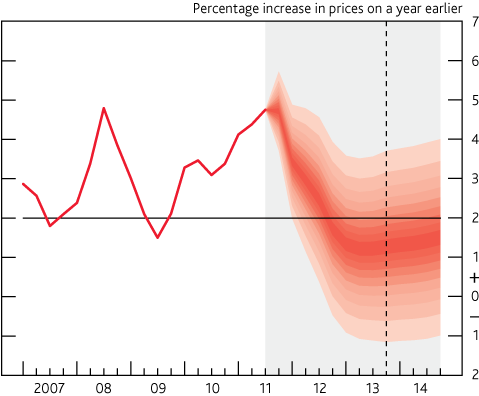Readers Question: What is meant by economic uncertainty?
Economic uncertainty implies the future outlook for the economy is unpredictable. When people talk of economic uncertainty, they usually imply there is a high likelihood of negative economic events. Economic uncertainty could involve.
- Predictions of a higher and more volatile inflation rate. (inflation uncertainty)
- Concerns over economic downturn – lower economic growth or full-blown recession (negative economic growth)
- People fear the prospect of being made unemployed.
- Concerns over prospects for exchange rate – e.g. rapid devaluation of the currency.
- Concerns over government borrowing – e.g. markets unwilling to finance more debt, leading to default.
- Major change in economic structure, e.g. the UK leaving EU
Economic uncertainty in the UK
Economic uncertainty in the UK can be illustrated by using these Bank of England forecast charts for economic growth.
A forecast chart shows the range of possible forecasts for economic growth. The Bank of England believe the most likely forecast is in the centre (thickest black line) However, the range of the fan shows different possible outcomes. The further into the future we look, the more difficult it becomes to predict future growth and inflation, and therefore the fan becomes wider.

source: Bank of England
(though I’m not sure who can predict economic growth of 6% for the end of 2013. I would have thought negative growth of -1% would be more likely…) But, then I’m not an economic forecaster.
Inflation Uncertainty

Source: Bank of England – showing predictions for inflation likely to fall below governments target of 2%.
Causes of economic uncertainty
- Supply Side Shock. A rise in oil prices or rise in commodity prices would cause an increase in the cost of production for firms. This would cause cost-push inflation. A supply-side shock can lead to stagflation – a combination of higher inflation and lower economic growth. A supply-side shock can be difficult to deal with (e.g Central Bank can’t solve inflation and lower growth by changing interest rates. Interest rates can either target lower inflation or higher growth – but not both at the same time.
- Demand Side Shock. A global economic downturn will have a strong impact on reducing growth in all countries. For example, if the EU enters into a recession, it will affect UK exports and UK economic growth.
- Financial instability. Bank closures could cause a bank run and loss of confidence in the financial system.
Uncertainty over current state of UK / Global Economy
- Uncertainty over future of Euro. Will Greece, Portugal and Italy be able to survive without defaulting on their debts and leaving the Euro. If there is a break up of the Euro, there could be a widespread credit crunch leading to a severe European Recession.
- Prospects for European economic growth. Even if the Euro does survive, it may be at a high cost. To reduce European budget deficits countries have embarked on severe austerity measures which reduce economic growth. Also, the imbalance in the Eurozone from the single currency could lead to continued economic stagnation and high unemployment.
- Solvency of European banks. If banks do lose money from Euro debt default, it could lead to a second credit crunch and fall in investment. This would also have ramifications for lower economic growth.
- Future commodity price inflation. Usually, when Europe / US is in a period of economic stagnation there is a drop in demand for oil, leading to lower oil prices. However, with China and India growing rapidly, oil prices could continue to rise. This causes problems for Europe because it would be faced with cost-push inflation at a time of economic recession.
Related

1 thought on “Economic uncertainty”
Comments are closed.